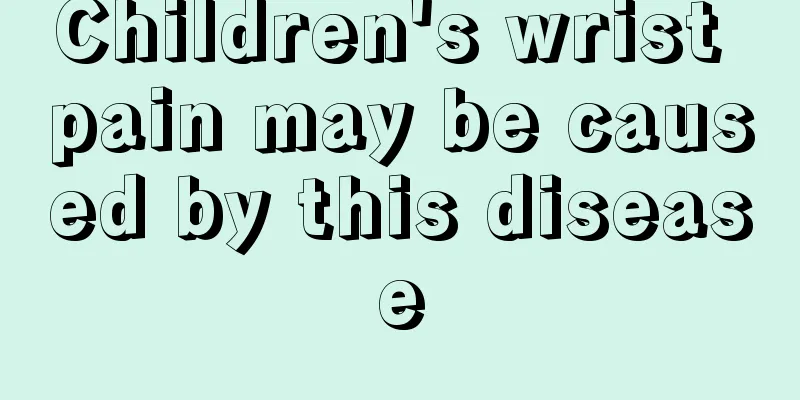Recovery period and treatment of bronchopneumonia in infants

|
Parents of children will find that after the baby is born, the child will always cough for no reason and the cough will be quite severe. First of all, this phenomenon does not rule out some symptoms of infant bronchopneumonia. So how to treat this type of disease? Next, I will introduce the recovery period of infant bronchopneumonia. 1. Causes In my country, the main pathogens are viruses, followed by bacteria, mycoplasma, chlamydia, fungi, etc. When the pathogen is determined, it is also called syncytial virus pneumonia, adenovirus pneumonia, Streptococcus pneumonia, Mycoplasma pneumonia, etc. Due to the anatomical and physiological characteristics of the children's respiratory tract, the vast majority of children (infants, toddlers, and preschoolers) suffer from bronchopneumonia. The disease can occur throughout the year, but peaks in late autumn and winter. 2. Symptoms The onset is acute, occurring within a few months after the onset of infection, with inflammation in both lungs. Cough is the main symptom of children with pneumonia. It starts with a dry cough, and in the later stages the cough is accompanied by phlegm in the throat. Fever: The degree and type of fever caused by pneumonia are different in different ages and due to different pathogens. There may be remittent fever (body temperature fluctuates between 2-3 degrees Celsius within a day) or prolonged fever. (Body temperature remains high and does not drop). Some children may not have fever or even a low body temperature when they have pneumonia (severely malnourished children and newborns with scleredema and pneumonia). Shortness of breath: manifested by increased respiratory rate, flaring of the nostrils, bluish lips, and the three-depression sign (depressions above the sternum, below the rib margin, and between the intercostal muscles during inspiration). Extremely severe cases may cause irregular respiratory rhythm, respiratory failure, and finally respiratory arrest. Children with pneumonia not only have the above-mentioned symptoms, but may also have gastrointestinal symptoms such as loss of appetite, vomiting, diarrhea, abdominal distension, etc. They may also become irritable and listless; severe cases may even suffer convulsions and coma. If you ask a doctor to check your body, you may find that there are many small and medium-sized blisters and dry rales in your lungs. Severe pneumonia can cause lesions in the circulatory system, nervous system, etc., and heart failure is the most common complication. Chest X-ray and chest film examination: different degrees of lesions in the lung fields can be found. 3. Nursing: 1. Pay attention to the rest of the sick child and create a quiet and comfortable rest environment for the sick child. 2. Let the sick child drink more water, eat small meals frequently, and eat nutritious and easily digestible foods. For children who choke on milk, add baby rice flour or cake powder to the milk to make it thicker. Eating this kind of milk can reduce choking. After each feeding, the nipple should be removed to let the baby rest for a while before feeding again, or the baby can be fed slowly with a small spoon. Children over 1 year old should eat easily digestible and nutritious foods such as porridge, noodles, and egg custard. Sick children have poor appetite and drink less breast milk and soup. In addition, fever and asthma increase the body's water consumption, so you should pay attention to feeding them water frequently to make up for the deficiency. First of all, parents cannot ignore their children's frequent coughs, especially babies who are a few months old. At this time, the children should drink more water. When the baby's bronchial pneumonia recovers, everyone must pay attention to ensure that the child has adequate water. |
<<: How to care for baby's mouth eczema
>>: Dietary considerations for severe eczema in infants
Recommend
How to measure the bone age of children?
Many parents are very concerned about their child...
What should children pay attention to when growing beans?
I believe that many people have experienced chick...
Why are children's hands and feet cold?
Children's bodies are not fully developed yet...
How to quickly whiten a tanned child?
The summer sunshine makes people full of energy. ...
Why do children sweat a lot when sleeping?
Sweating is very common. Many people sweat when t...
What should I do if my one and a half year old baby has a picky eater?
Being picky about food is a very bad habit. Picky...
5-year-old girl's underwear is yellow
The phenomenon of yellowing underwear is generall...
Treatment of inguinal hernia in children
Children are more likely to be infected with bact...
What causes blisters on children's legs?
Children can be said to be the hope of the entire...
What's the matter with the little red spots on my face that itch a little?
There are small red spots on the face and they ar...
What should I do if my 9-month-old baby has a poor appetite?
If the baby catches a cold, he will have a poor a...
Why are the newborn's eyes yellow?
Nowadays, every child is the treasure of the fami...
It turns out that there are these disadvantages of enema for children
Enema is a very common treatment technique that c...
What kind of rash is it when a child has a low-grade fever?
It is a common skin disease for infants and young...
What is jaundice? Different types have different causes.
Many newborns are particularly prone to jaundice....









